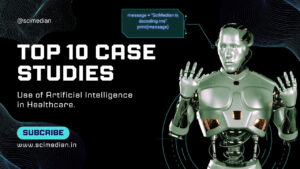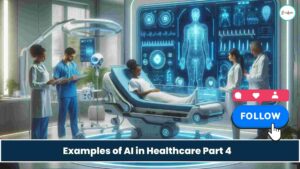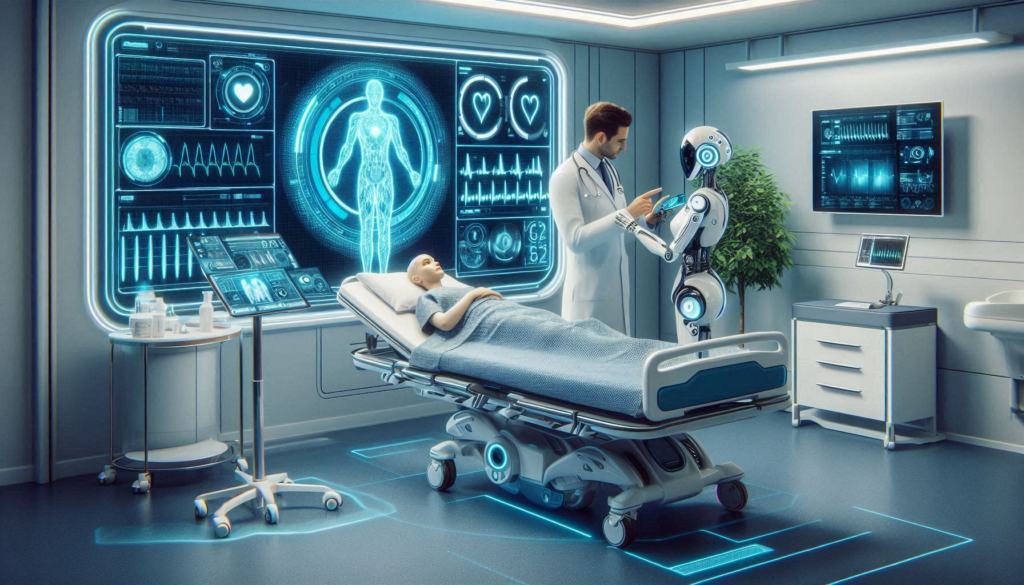What is the application of AI in healthcare?
Artificial Intelligence (AI) has emerged as a powerful force in modern industries, revolutionizing processes, decision-making, and outcomes. In healthcare, AI’s impact is profound, touching every aspect of patient care, research, and administration. In this comprehensive blog post, we’ll explore the multifaceted applications of AI in healthcare, from diagnostics to operational efficiency

Understanding AI in Healthcare
Definition and Components
AI in healthcare encompasses various technologies, including:
- Machine Learning (ML): Algorithms that learn from data and improve their performance over time.
- Natural Language Processing (NLP): Enabling computers to understand and generate human language.
- Robotics: Automating tasks such as surgery or drug dispensing.
- Predictive Analytics: Identifying patterns and making informed predictions based on historical data.
Historical Perspective
The journey of AI in healthcare began decades ago. Early milestones include rule-based expert systems and automated diagnosis tools. Today, AI algorithms power medical imaging, drug discovery, and personalized treatment plans.
Diagnostic Applications
AI in Imaging
Radiology: AI analyzes X-rays, MRIs, and CT scans to detect anomalies, tumors, and fractures. Faster and more accurate diagnoses lead to better patient outcomes.
Pathology: AI assists pathologists in identifying cancerous cells and tissue abnormalities.
Predictive Analytics
AI algorithms analyze patient data to predict disease progression. Early diagnosis becomes possible, allowing timely interventions. For instance, diabetic retinopathy can be detected early through AI-driven image analysis.
Treatment and Personalized Medicine
Treatment Planning
AI assists clinicians in creating personalized treatment plans. It considers patient history, genetics, and drug interactions.
Precision Medicine: Tailoring therapies to individual genetic profiles optimizes treatment effectiveness.
Drug Discovery
AI accelerates drug development by analyzing vast datasets. It predicts potential drug candidates, reducing trial-and-error cycles.
Targeted therapies emerge, benefiting patients with specific genetic markers.
Operational Efficiency
Hospital Administration
AI optimizes hospital operations:
Resource Allocation: Efficiently allocating staff, equipment, and facilities.
Scheduling: Smart scheduling minimizes patient wait times.
Workflow Optimization: Streamlining processes for better patient care.
Examples
AI-driven chatbots handle administrative queries, freeing up staff.
Predictive maintenance ensures medical equipment availability.
Patient Care and Support
Monitoring and Management
- Wearable devices collect real-time health data (heart rate, blood pressure, etc.).
- AI analyzes trends, alerting healthcare providers to anomalies.
- Remote monitoring enhances patient care, especially for chronic conditions.
Virtual Health Assistants
- Chatbots and virtual assistants engage patients:
- Answering queries.
- Providing medication reminders.
- Offering emotional support.
Ethical and Regulatory Considerations
Ethical Challenges
- AI introduces biases if not carefully designed. Transparency and accountability are crucial.
- Clinicians must understand AI recommendations and retain decision-making authority.
Regulatory Landscape
- Navigating laws and guidelines ensures patient safety.
- Compliance with privacy regulations protects sensitive health data.
- Trust in AI systems depends on robust governance.
Future Prospects and Innovations
Emerging Trends
- Interdisciplinary collaboration drives innovation.
- AI integrates with genomics, wearables, and telemedicine.
- Predictive models evolve, anticipating disease outbreaks and treatment responses.
Breakthroughs
- Quantum computing and explainable AI hold promise.
- Personalized drug dosages, AI-powered robotic surgery, and brain-computer interfaces are on the horizon.
Conclusion
AI’s transformative potential in healthcare is undeniable. Let’s embrace this revolution, collaborate, and create a healthier future. Stakeholders—clinicians, researchers, and policymakers—must champion responsible AI adoption.
Thank you
Read our latest posts
- DNA sequencing Overview, Process, and Sequences
- Whole exome sequencing Results, Diseases Detection, and clinical exome sequencing
- Whole exome sequencing Cost, Importance, and time
- What is Whole Exome Sequencing in 2025 in 2 minutes
- 10 Case Studies of Successful Implementation of AI in Healthcare By SciMedian.
- Top 5 Examples of AI in Healthcare- By SciMedian [Part 4]








![Top 5 Examples of AI in Healthcare- By SciMedian [Part 1]](https://scimedian.in/wp-content/uploads/2024/07/Artificial-intelligence-1-1024x576.jpg)
